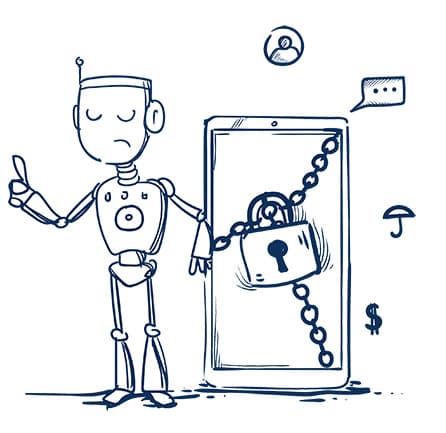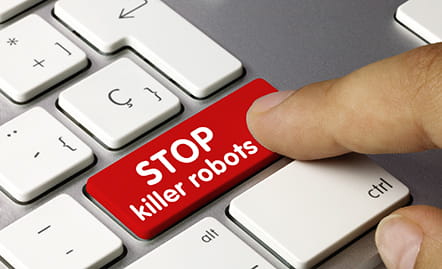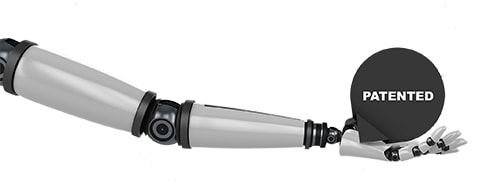Can artificial intelligence machines be patented or sued?
Introduction
 Hollywood movies introduced the concept of artificial intelligence to the world. Following the portrayal of artificial intelligence, many have speculated that robots will one day take over the world and subdue humans as their subjects. For this to happen, artificial intelligence machines would have to attain full human capacities and surpass them. The question of whether artificial intelligence machines can eligible for a patent or can be subject of legal proceedings is a step in understanding whether artificial intelligence machines are progressively taking over the world.
Hollywood movies introduced the concept of artificial intelligence to the world. Following the portrayal of artificial intelligence, many have speculated that robots will one day take over the world and subdue humans as their subjects. For this to happen, artificial intelligence machines would have to attain full human capacities and surpass them. The question of whether artificial intelligence machines can eligible for a patent or can be subject of legal proceedings is a step in understanding whether artificial intelligence machines are progressively taking over the world.
Overview: Artificial intelligence
Generally, artificial intelligence is the ability of machines or software to process information, make decisions and take actions to achieve an objective. More succinctly artificial intelligence is the development of computer systems able to perform tasks usually requiring human knowledge or programs that mimic how humans think. The core traits of such computer programs are visual perception or machine vision, speech recognition, decision making, understanding natural languages, learning, reasoning, planning, ability to manipulate, move objects and self-correction. Weak artificial intelligence and strong artificial intelligence are the two distinct forms of artificial intelligence. Weak artificial intelligence is that which is designed to perform a specific task. Strong artificial intelligence is that which has general human cognitive abilities.
There are four types of artificial intelligence machines. The first type is reactive machines, for example, programs that can play chess. The second type is called limited memory, and it entails computers systems that can use memories to make a better future decision. Self-driving cars use this kind of computer system among others. The third type of artificial intelligence is called the theory of mind, and this type of computer system respects the desires, beliefs and intentions that impact the decisions of others which affect their decision making.
There are several examples of artificial intelligence technology. Automation is a system or process that functions automatically. Machine learning is a process that entails enabling a computer despite never being programmed. Machine vision allows computers to see in a way that is comparable to human eyesight. Natural language processing involves a computer hearing and human process language through a program. Robotics refers to designing and manufacturing robots too complicated for humans.
Artificial intelligence can be used in healthcare to help in diagnosis, storing and examining patient data, assisting patients in scheduling appointments and following up meetings as well as helping them with the billing process. In business, artificial intelligence can be used to perform repetitive tasks that can be done by humans. Artificial intelligence can also be used in this sector to assist customers. In education, grading papers and tutoring students are some of the uses of artificial intelligence. In finance, artificial intelligence provides financial advice and collect personal data. In the legal sector, artificial intelligence can be used to scan through high volumes of documentation to find relevant information. Lastly, in the industrial and manufacturing sector, weak artificial intelligence machines are used along the production line.
One cannot exaggerate the importance of artificial intelligence. Artificial intelligence eliminates human weakness and propensity to fatigue by performing high-volume and tedious tasks. Artificial intelligence also adds intelligence to existing products thereby enhancing their functionality and usefulness. Artificial intelligence can analyse more data and more in-depth data. It is more accurate and gets the most out of the data. Artificial intelligence is highly adaptive and can react to input information changes and as goals and requirements evolve.
Can Artificial intelligence machines be sued?
 Whether one can institute legal proceedings against artificial intelligence machines is dependent on whether the machined can be said to have a legal personality. A legal person is an entity that has legally recognised rights and responsibilities. Artificial intelligence machines do not inherently have a legal personality. Consistent with this view the 1984 case of United States v Athlone Indus., Inc., the court stated that robots could not be sued. There is a way to confer legal personality to an artificial intelligence machine. In the United States of America, an owner of a limited liability company in the United States can hand over his or her rights of ownership to a machine. Legal personality and the ability to own assets go hand in hand. The artificial intelligence machine can then be said to hold a legal personality.
Whether one can institute legal proceedings against artificial intelligence machines is dependent on whether the machined can be said to have a legal personality. A legal person is an entity that has legally recognised rights and responsibilities. Artificial intelligence machines do not inherently have a legal personality. Consistent with this view the 1984 case of United States v Athlone Indus., Inc., the court stated that robots could not be sued. There is a way to confer legal personality to an artificial intelligence machine. In the United States of America, an owner of a limited liability company in the United States can hand over his or her rights of ownership to a machine. Legal personality and the ability to own assets go hand in hand. The artificial intelligence machine can then be said to hold a legal personality.
Currently, an artificial intelligence machine cannot be sued because the law refers to it either as a product or a service. If it is a product, then the manufacturer can be sued for breach of warranty based in a contract, or a product liability claim can be instituted, holding the manufacturer strictly liable for the defect in the artificial intelligence machine.
Case law on whether machines can be sued is limited because these artificial intelligence machines have been regarded as either products or services. For instance, In 2015 in Switzerland a robot was confiscated by the police because it was used to make illegal purchases on the dark web. It is important to note, however, that the robot was not charged with a crime.
Existing intellectual property laws does not recognise the artificial intelligence machine's right to invent a new piece of technology that can be patented.
Both the United Kingdom and the United States have repeatedly declined to impose liability on artificial intelligence machines. The rationale for this is that liability for a crime arises where the accused had the intention to commit the crime. The concept of intention includes a person who instructed a person who lacks mental capacity or an animal to commit a crime. These principles can also be applied in the case of artificial intelligence machines. The creator of an artificial intelligence machine can also be held liable if the typical functions of the machine could be used to perform a criminal act. If the programmer of the artificial intelligence machine was aware that this outcome was a probable consequence of its use, then he or she will be held liable. The inventor of the artificial intelligence machine can also be held accountable if the artificial intelligence system pursues a course of action that culminates in a criminal act.
Patenting
To understand whether artificial intelligence machines can be patented, one must realise what patenting entails. A patent is a version of the intellectual property. The World Intellectual Property Organisation (WIPO) defines intellectual property as a creation of the mind. The owner of an invention is given patent rights which means that they are the only individual allowed to make, use, sell and import an invention for a period of usually 20 years.
Whether artificial intelligence machines can be patented is a multifaceted issue. Existing law is insufficient and not evolving fast enough for the circumstances. Intellectual Property laws were drafted before the introduction of artificial intelligence and artificial intelligence machines. According to these laws, only a human can be an author and therefore, just a human can qualify the rights and benefits acquired through a patent.
Artificial intelligence machines are the result of a human being encoding or programming them. Some might argue that such programming is comparable to a literary work. If this argument were to be accepted, artificial intelligence is a work that creates other works. For the work of an artificial intelligence system to be patented, the machine would have to have an independent entity.
In Europe, artificial intelligence can be patented subject to specific guidelines. The European Patent Office (EPO) has published its guidelines for examination. The guidelines prescribe how the process of patenting should be carried out. These guidelines show how patent applications directed towards inventions for artificial intelligence should be handled. The EPO guidelines state software and abstract mathematical models are not patentable, but if the idea is implemented, it then becomes eligible for patenting.
The Gulf Cooperation Council has stated that algorithms and code cannot be patented. Arguably the same rule applies to artificial intelligence machines According to the Copyright Designs and Patents Act of 1988 in the United Kingdom, the author of any literary, dramatic, musical or artistic work created by a computer is the person that made the arrangements necessary for the creation of the work undertaken. Artificial intelligence cannot be legally protected unless some human intervention takes place. The founder, or owner or the head of the company who owns the artificial intelligence will be named the inventor of the inventor.
In the United States of America, the court in the 2015 case of Hewlett Packard Co. v. ServiceNow, Inc., No. decided that abstract ideas of future artificial intelligence were not eligible for a patent. The court remarked that one might be able to patent a specific implementation of an abstract idea involving a patent. However, the general tone of the judgment indicated that an artificial intelligence idea had to come into being before it could be patented.
Regarding whether an invention created by the artificially intelligent machine can be patented, the United States Court in the case of New Idea Farm. Equip — Corp. v. Sperry Corp. stated that only people conceive ideas and not machines. The Copyright Office reinforced this decision by saying that it will decline to register works produced by a machine or mechanical process if there has been no creative input or intervention from a human.
Recommendations
It is submitted that the legal framework that is currently in place regarding artificial intelligence machines is sufficient for the current state of affairs. Although artificial intelligence can perform single specialised tasks more effectively and efficiently than a human ever could, there are certain limitations to the computer systems. While humans can perform many tasks; artificial intelligence machines can only perform one clearly defined function. A human can play a game of solitaire and then drive a car afterwards, whereas an artificial intelligence machine in the form of a self-driving car, is unable to do so. Until artificial intelligence machines can perform multiple tasks, or even multitask as humans do, they should not be granted personhood under the law.
There should however be extensive regulation of artificial intelligence machines. Driving requires making decisions, and sometimes those decisions are ethical. A computer program, when faced with an imminent car accident may decide to minimise damage to the car; however, this may result in more harm to the humans involved. A computer program is unable to exercise empathy when making a decision. For instance, in 2015 a man was crushed by an automated robot along the Volkswagen assembly line. It is assumed that a robot cannot form the necessary intention to commit the crime of murder and therefore the robot was not charged. If there were regulations that limited the interaction between humans and robots, perhaps such accidents could be avoided.
 The current legal system, with its focus on humans, is unable to deal with the challenges related to the use of artificial intelligence machines. Where a human can argue the defences of intoxication or insanity, an artificial intelligence machine must be able to plead malfunction as a defence to escape liability. New legislation and legal precedent to interpret such law are required. Until then artificial intelligence machines cannot be sued, and cannot be patented
The current legal system, with its focus on humans, is unable to deal with the challenges related to the use of artificial intelligence machines. Where a human can argue the defences of intoxication or insanity, an artificial intelligence machine must be able to plead malfunction as a defence to escape liability. New legislation and legal precedent to interpret such law are required. Until then artificial intelligence machines cannot be sued, and cannot be patented
Conclusion
Strong artificial intelligence is progressively becoming more and more common. Potentially, this may mandate a change in the legal standing of artificial intelligence machines. The legal definitions of “legal personality” and creations of the mind would have to be altered to accommodate artificial intelligence machines. Currently, artificial machines are not legal persons, therefore cannot be sued and are ineligible to obtain a patent
 English
English
 عربي
عربي Русский
Русский 官话
官话 português
português
 Türk
Türk 














